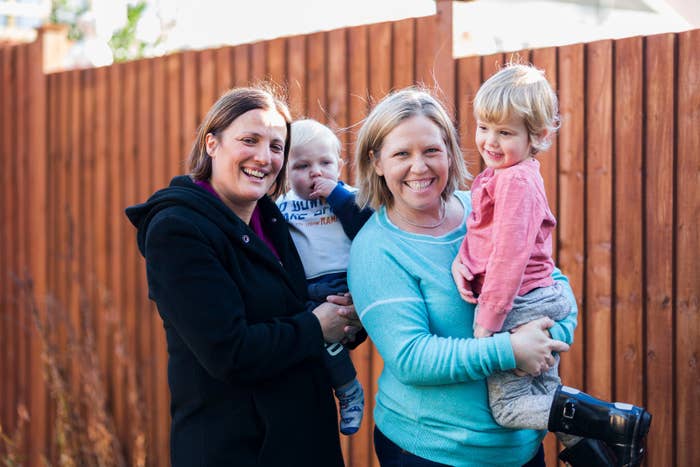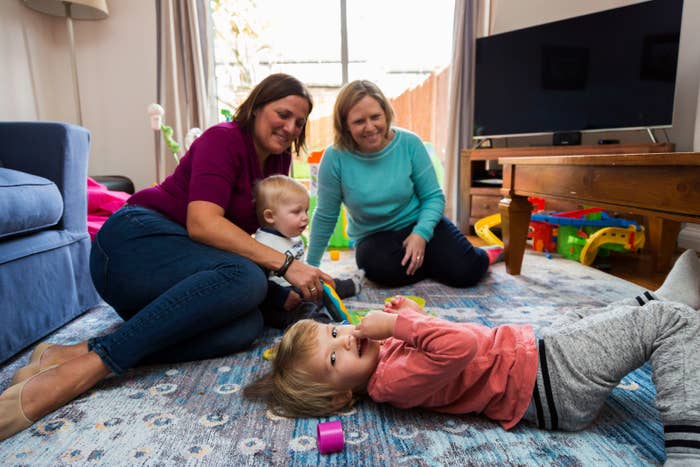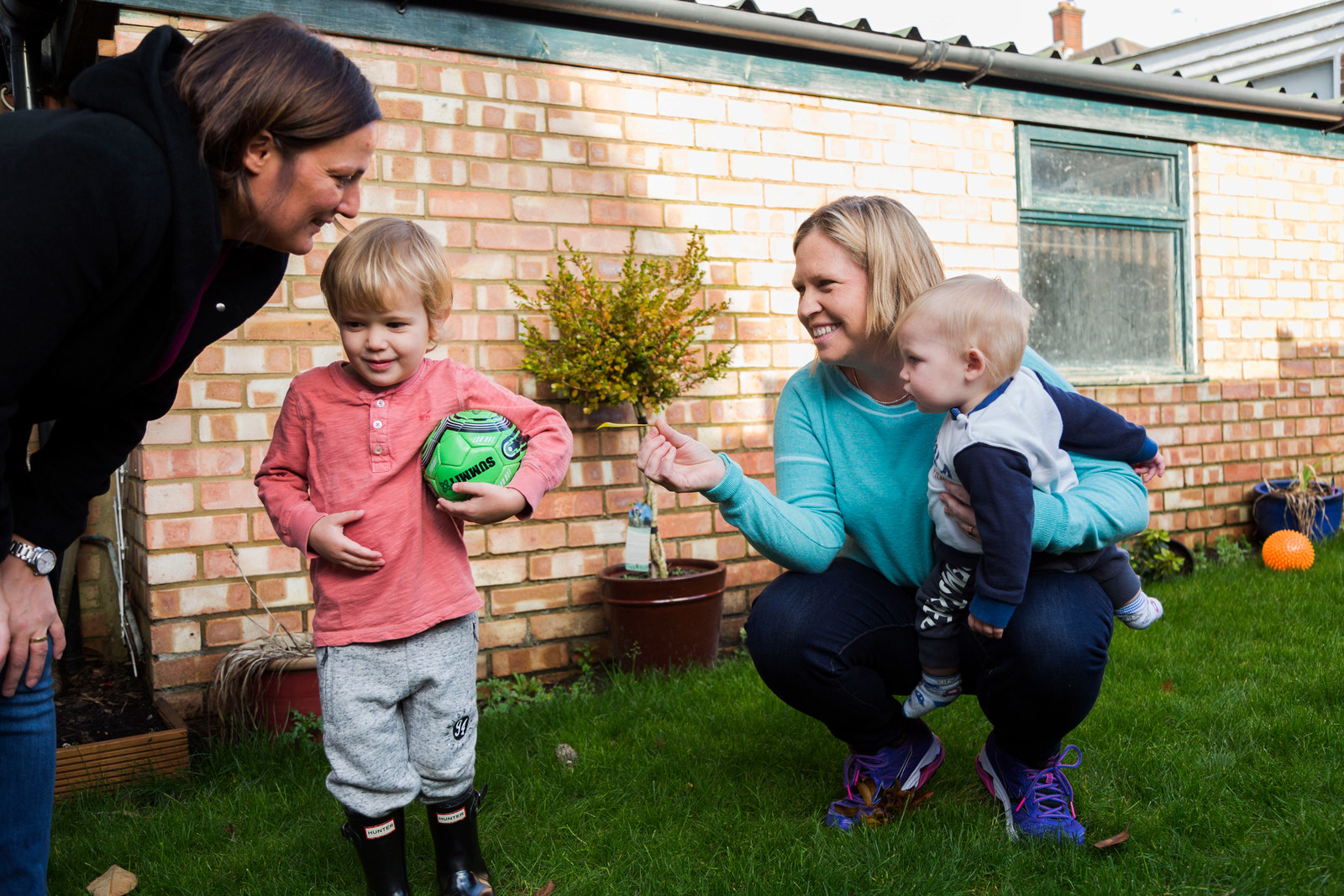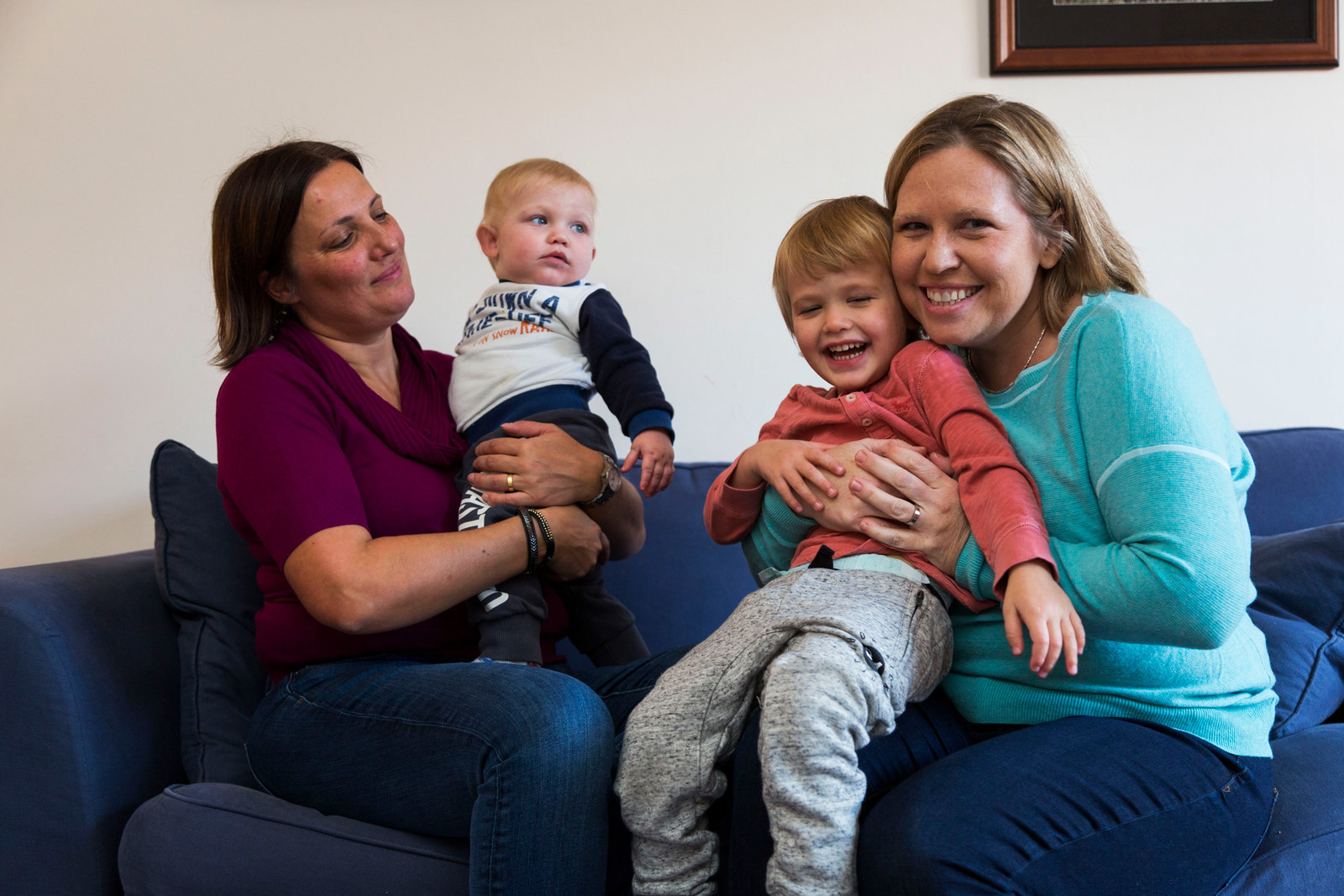
Allison Blixt was standing with her wife, Stefania Zaccari, at the counter of the US embassy in London when a member of staff started asking her whose eggs were used to make their first child, Lucas.
It was 2015, two months after Lucas was born, and the beginning of an interrogation that would leave Blixt stunned and lead, this week, to a landmark lawsuit.
The official told her that despite Blixt being a US citizen, despite her and Zaccari being married, and despite both of them being named on Lucas’s birth certificate as the parents, because Blixt did not give birth to Lucas – and Zaccari, an Italian citizen, did – she could not register him as a US citizen.
It would mean they would never be able to return to Blixt’s home country and live as a family. The same would not have been the case, she told BuzzFeed News from their home in south London, had she been in a heterosexual relationship.
“I was in shock,” she said. “Tears started going down my face.”
On Monday, the couple filed a lawsuit against the US State Department, alongside another same-sex couple, claiming the department’s policy contravened the Immigration and Nationality Act.
Although this law enables children to acquire the citizenship of an American married parent, the State Department's interpretation of this insists on a blood or biological relationship – either genetic or gestational.
Therefore, for same-sex couples who use certain fertility treatments – in Blixt and Zaccari’s case, a sperm donor – the same right is not granted. Adopted children, however, are granted citizenship. It is, said Blixt, inconsistent, nonsensical, and discriminatory.
She and Zaccari sat in their living room with Lucas, now 3, playing on the floor as they explained to BuzzFeed News what happened to them and what it has meant.
That day in the embassy, said Blixt, the questions kept coming as the official attempted to ascertain whether Lucas met the criteria for citizenship. The family were standing at the counter’s window, in view of other members of the public. After asking whose eggs were used to conceive Lucas, the member of staff, said Blixt, inquired “Who carried him?” and “Where is the donor from?”
Astonished, Blixt, a former corporate lawyer, said she began asking why they were being questioned in this manner: “Where are we going with this? How does that even matter?”
But when Blixt complied and told the official that the donor was not from the US, and that she did not give birth to Lucas, the conclusion came swiftly. “She says, ‘OK, well under those conditions Lucas doesn’t get citizenship.’”
As Blixt started to cry, Zaccari started challenging the decision, to no avail. “I was basically saying, ‘Are you serious?’” said Zaccari.
With no recourse against the refusal available at the embassy, the couple left.

“I was just devastated and came home,” said Blixt. “The lawyer in me was like, ‘I have to find out the answer – why is this the case?’”
The couple began to contact friends in the US who might be able to help and were soon introduced to Immigration Equality, an advocacy group that focuses particularly on LGBT immigration cases. In the meantime, however, Blixt and Zaccari tried to get on with their lives, raising Lucas, working, and visiting the US when they could.
In 2017, they had another child, Massi, also by sperm donor. This time, Blixt gave birth. Soon after, they returned to the embassy and applied for US citizenship for both their sons. After delivering their application a member of staff took them to a side counter.
“They said, ‘Do you realise that Lucas is going to be denied even though Massi is going to get citizenship?’”
Despite Blixt's attempts to explain their predicament, a conversation with another official a couple of hours later confirmed the decision: Her youngest child would inherit her citizenship but her eldest would not. “One of the managers said, ‘You’re not his [Lucas’s] gestational or genetic mother and that’s what the State Department policy says you have to be.’”
The couple asked that the application be processed anyway, to ensure they could legally challenge the refusal. Blixt said the member of staff, when told of the proposed legal action, informed the couple they were not the first to be in this situation and embassy staff would therefore follow the case with interest.
It is, said Blixt, a case of “flat-out discrimination”.

“If we had used assisted contraception but were a straight couple, they never would have said, ‘Whose eggs are they and whose sperm is it?’ because there’s a presumption that if you’re married and you have a child that that child is the child of the marriage. But we walk in the embassy and they know there’s something missing there – [that] we had to have used some kind of assisted conception.”
“There is no such thing as equality for us,” added Zaccari.
For Blixt, it is as if her own government deems her a second-class mother to her eldest child.
“As lesser,” she said. “It was bad enough when it was just Lucas, but then having Massi brings it even more to the fore – you’re saying I’m a different mother to one than to the other? That’s absolutely not true. To me they are the same and to Stefania they are the same.”
This conclusion by the US government has served to remind Blixt that their family is different, “other”, she said.
“Normally, day to day, we don’t think about this stuff, because we’re just a family like any other: We take our kids to nursery, we go to work, we want the best for them, we go on holiday, we get annoyed, we have fun. But when that happened it brought to the surface that we’re not just a normal family, because we’re not viewed the same by the government as other families.”
By contrast, the country in which they live – the UK – has no such policy and in the first instance enabled them to live in London and have a civil partnership in 2009, which was later upgraded to a marriage. “How am I having more rights here where I wasn’t a citizen than I was having in my own country?” said Blixt. “How is the UK more supportive of me than the US?”
The circumstances of this citizenship refusal, said Blixt, serve only to underline the existing barriers they faced from their own countries as a same-sex couple.
She and Zaccari met in a bar in New York in 2006, where Blixt was living and Zaccari, from Rome, was visiting on holiday. There was an immediate attraction, so much so that the pair spent the rest of Zaccari’s holiday together.
It was the beginning of what would become a long-distance relationship with the women visiting each other between Rome and New York. After just three weeks, the intensity of their feelings led to a conversation in the street that they remember word-for-word even today.
“She said, ‘I love you’, and I’m [thinking], ‘This can’t be possible’ and then I thought, ‘I do too, but how can that be?’” After seven months, they tried to split, aware how impractical, if not impossible, a transatlantic relationship would be. But it didn’t work – they knew they had to be together and so began to explore different options. Italy at the time did not recognise same-sex relationships and nor did the US.

They both wanted to live in New York but none of the possible routes – student visa, sponsorship from an employer – were feasible. It left one option: moving to London, where Blixt’s firm had an office and where Zaccari could live as an EU citizen. They thought this would solve all the obstacles facing them as a couple and as future parents. With the support of their friends and families, they came to London to start a new life.
When, therefore, the US embassy told them otherwise, it invoked all the anger Blixt had felt in 2008 when she realised the US would not allow her to bring her partner to her own country.
“It all came back to me,” she said. But this time, “It’s not just about me, it’s about my child.”
The only possible solution to Lucas’s citizenship problem, said Blixt, would be for her to apply as his stepmother. “I’m his mother, not his stepmother,” she said. “I’m on his birth certificate. Out of principle: no.”
But even if she were to try as his stepmother, it would not provide Lucas with birthright citizenship, which provides the full rights available to Americans, such as running for the highest office.
The denial of citizenship has already begun to take effect on the family. On maternity leave with Massi, the family travelled to the US to spend time with Blixt’s parents, and would have liked to have stayed longer but had to return within 90 days in accordance with the tourist visa limitations on non-US citizens. It was a foreshadowing, said Blixt, of what they will face should they attempt to move to the US permanently.
But despite being refused twice, Blixt is optimistic that they will win the case for Lucas. Because it is a matter of interpretation of the existing law rather than a need for a new one, it does not need to go through Congress and the judge assigned to the case could instruct the State Department to make a change – or the department could decide to change its rules before then.
A petition has also been set up for members of the public to voice their concerns about the policy to the State Department.
Blixt and Zaccari have had to tighten up personal security on social media and other platforms in fear of a backlash as the case and publicity mounts, but they remain determined to keep fighting for both their sake and others in similar situations.
“It doesn’t just affect us,” said Blixt. “I’m not going to let it go.”
The State Department did not respond to a request for comment prior to publication.
UPDATE:
Following the publication of this story, a Department of State official told BuzzFeed News: “We do not comment on pending litigation.”
